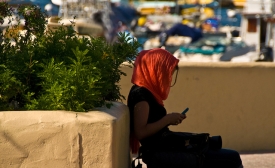digital diplomacy & new tech
Cuba International Network (CIN) recently became the first U.S. company authorized to set up shop in Cuba to provide equipment and personnel there to support the production of broadcasting, television, and filming of video content for consumption in the U.S. and international markets. This first-of-its-kind service brings vital film and broadcasting capability and services to Cuba with the same standards found in the U.S.
After trying many ways to confront ISIS’ campaigns on the internet to recruit Westerners, in particular Americans, the U.S. State Department launched a program that seeks “to appeal to emotion rather than logic” as The New York Times said on Friday. “Daesh deprives a woman of her voice,” reads one image that is part of a new State Department program, using the Arabic acronym for ISIS.
Is Pokémon Go a game changer for the Japanese economy? Is it a sign that Silicon Valley-style innovation is reinvigorating corporate Japan’s notoriously insular management? Might this be the first big success story for Prime Minister Shinzo Abe’s “Cool Japan” initiative, a key element in the structural reforms promised but so far undelivered by Abenomics?
In the age of digital diplomacy, governments often turn to social media following a crisis, be it a terror attack or natural disaster. Social media may be used by governments in order to comment on crises as they develop, offer a narrative of events and demonstrate that the government is functioning and attempting to regain control of the situation.
It is important to think about how climate change will affect food security, water resources, and natural disasters, especially in underdeveloped countries. Dr. Patricia Solis is trying to understand how different communities around the world can anticipate and mitigate the effects of climate change using geospatial technologies like Geographic Information Systems (GIS) and remote sensing.

Refugees learn German via text messages.
Wouldn’t it be great if your government owned the English name of your country on Twitter? You could proudly @mention your country or support your national team with a tweet. Today all English-language country names have been registered on Twitter; however, only 23 governments and state tourism boards have secured their English-language country name on Twitter, up from only nine, four years ago.
Maylis and her three friends are ambitious young computer programmers who study together in the northern city of Saint-Louis, and are part of a growing push to get girls coding in Senegal and several other African countries. Coding clubs have been set up for girls between the age of five and 24 as part of a #RewritingTheCode campaign started by the charity Theirworld.







